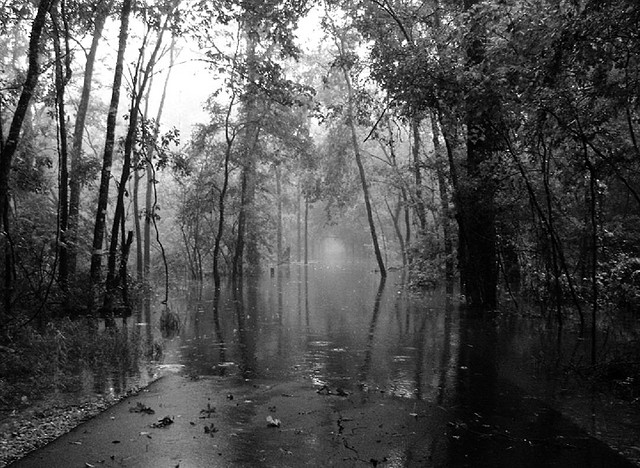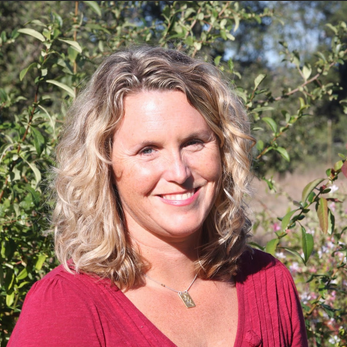Home Is an Uncanny Valley
if the rain continues
then we may lose our escape down the gravel-throated drive
<truth> we are hungry for the rain </truth>
if the rain edits the earth of the fields
if the rain rewrites the soapstone creek bed
if the ditches we dug into the earth just yesterday overflow
then the path back to ourselves could be blurred by the many rainstorms before
LIST# 1987, 1992, 2005
PRINT# Each flood, spilling into the next like a series of connected lakes.
<fear> the child looking out the rain-freckled window could be ourselves </fear>
<truth> we are hungry for the rain </truth>
<fear> we are hungry for the truth </fear>
The reservoirs are low, exposing what we’d forgotten: old logs, rusted cars, a body or two.
if we flood again
then we could forget the hunger
then we could forget what’s underneath, exposed
if home is an uncanny valley AND
we walk toward it, see that it is too much like ourselves to believe
then the fields, the creek beds, the gravel-throated drive
will scream muddy loud
<fear> the child looking out the rain-freckled window could be ourselves </fear>
<truth> we are hungry for the rain </truth>
<fear> we are hungry for the truth </fear>
Let home = null/washed new/a place built upon a place
Let memory fade like a fog
Let the child at the window be my child, not myself
Let the water find its path back
Let the rain spell out a truth on the tin roof above our sleeping heads
Let path out open like a mouth
 Hybrid Algorithm
Hybrid Algorithm
at Luther Burbank Gardens, Santa Rosa
Mounds of earth like open graves
grammared by stones and toothy Shasta daisies.
Sensory garden, medicinal garden, garden of starts and failures.
To question history is to watch the chaos of its particles
glisten into discernable patterns.
We loosen embedded stones with our toes
amongst the trees that grow into each other.
We ask: where is he buried?
Light caught in the fingers of trees.
We ask: where are the unattested species recorded?
Indecipherable writing in notebooks
sketches of leaves, a seed as big as a child’s fist.
Please do not record inside.
Please do not disturb the war of air outside.
What’s pushing up—ache of earth against this litany of breeding air—
from mind to mind to mouth to air.
Patterns illuminate—a nestle of leaves from the ghost
of a fallen tree—cedar of Lebanon.
The breeding between what will be
and what will be left for us to believe.
Art Information
- "A Lot of Rain" (Jesse H. Jones Park and Nature Center, Humble, Texas) © Patrick Feller; Creative Commons license.
 Iris Jamahl Dunkle's debut poetry collection, Gold Passage, was published by Trio House Press in 2013. Her second manuscript, Interrupted Geographies, was a finalist for the 2012 Colorado Prize for Poetry. She's also published two chapbooks with Finishing Line Press, Inheritance (2010) and The Flying Trolley (2013). Her poetry, creative nonfiction, and scholarly articles have appeared in numerous publications, including Poet’s Market 2013, Crab Orchard Review, Fence, LinQ, VOLT, The Mom Egg, The Squaw Valley Writers Review, and Talking Writing.
Iris Jamahl Dunkle's debut poetry collection, Gold Passage, was published by Trio House Press in 2013. Her second manuscript, Interrupted Geographies, was a finalist for the 2012 Colorado Prize for Poetry. She's also published two chapbooks with Finishing Line Press, Inheritance (2010) and The Flying Trolley (2013). Her poetry, creative nonfiction, and scholarly articles have appeared in numerous publications, including Poet’s Market 2013, Crab Orchard Review, Fence, LinQ, VOLT, The Mom Egg, The Squaw Valley Writers Review, and Talking Writing.
Dunkle currently teaches writing at Napa Valley College and Clarion University and with California Poets in the Schools (CPITS). She is on the staff of the Napa Valley Writers conference and resides with her family in northern California.
